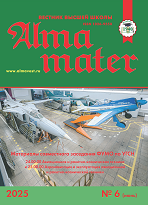UDC 37.09
https://doi.org/10.20339/AM.07-20.035
V.G. Lizunkov is Cand.Sci. (Pedagogy), doc. at Yurga Technological Institute (branch) of National Research Tomsk Polytechnic University e-mail: vladeslave@rambler.ru; and E.V. Politsinskaya is Cand.Sci. (Pedagogy), doc. at National Research Tomsk Polytechnic University e-mail: Katy031983@mail.ru
Researched is the problem of acceleration of scientific technical progress, when accumulated knowledge become old, and volume of new knowledge demonstrates steady growth. Under such conditions, the role of additional professional education (DPO) goes in steady growth. In the article, examined are methodological principles, enabling solvation of the problem of organization of project training, using in the system of DPO on the basis of higher school as to reckoning needs of modern society under conditions of forming of territory of outstripping social economic development (TOSER). The authors present architecture of integrated model of traditional and project education in the system DPO, and also proposed practical recommendations as to organization and incorporation of project activity during training of personnel in demand by TOSER.
Key words: TOSER, additional professional education, training, re-training, architecture of integrated model of traditional and project education, personnel in demand.
References
- Filatova, M.Yu. Research in evolution of scientific views on international labor migration. Izvestia of Tula state university. 2015. No. 4 (1). P. 216–222.
- Bondarenko, O.V. Personnel politic of industrial enterprises as instrument of regulation of structure dis-balance on labor market. Scientific notes of KnAGTU. 2015. No. IV-2 (24). P. 87–91.
- Larionov, A.O. Evaluation of industrial potential of region at territory. URL: https://cyberleninka.ru/article/n/otsenka-promyshlennogopotentsiala
- Demikhov, K.E. Engineering education: state, problems, perspectives. URL: https://cyberleninka.ru/article/n/inzhenernoe-obrazovanie-sostoyanie-problemy-perspektiv
- Hämeen-Anttila, K. Saano, S., Vainio, K. Professional competencies learned through working on a medication education project. American Journal of Pharmaceutical Education. 2010. Vol. 74 (6). С. 1–8.
- Queiroz-Neto, J. P. Using modern pedagogical tools to improve learning in technological contents. Proceedings of Frontiers in Education Conference, FIE. 2015. P. 1–8.
- Ginestié, J. The Industrial Project Method in French Industry and in French Schools. International Journal of Technology and Design Education. 2017. Vol. 12 (2). P. 99–122.
- By Mo, John, P.T.; Tang, Y.M. Project-based learning of systems engineering V model with the support of 3D printing. Australasian Journal of Engineering Education. 2017. Vol. 22 (1). P. 3–13.
- Pounds, P.E.I. Teaching mechatronics with tuned problem-based projects. Australasian Journal of Engineering Education. 2015. Vol. 20 (1). P. 41–58.
- Palmer, S., Hall, W. An evaluation of a project-based learning initiative in engineering education. European Journal of Engineering Education. 2011. Vol. 36 (4). P. 357–365.
- Xu, Y. Liu, W. A project-based learning approach: a case study in China. Asia Pacific Education Review. 2010. Vol. 1 (3). P. 363–370.
- Du, X. Su, L., Liu, J. Developing sustainability curricula using the PBL method in a Chinese context. Journal of Cleaner Production. 2013. Vol. 61. P. 80–88.
- Safonova, K.I., Podolsky, S.V. Project activity of students at higher school: planning of projects and evaluation of results of their realization. Society: sociology, psychology, pedagogy. 2018. No. 5. P. 83–94.
- Pyankova, L.A., Khomicheva, V.E. Project activity at higher school as condition of formation of motive value component of professional self-determination of students at technical university. Society: sociology, psychology, pedagogy. 2019. No. 3. P. 86–90.
- Neprokhina, I.V. Projecting as trend of modern system of education. Society: sociology, psychology, pedagogy. 2018. No. 4. P. 90–93.











.png)






